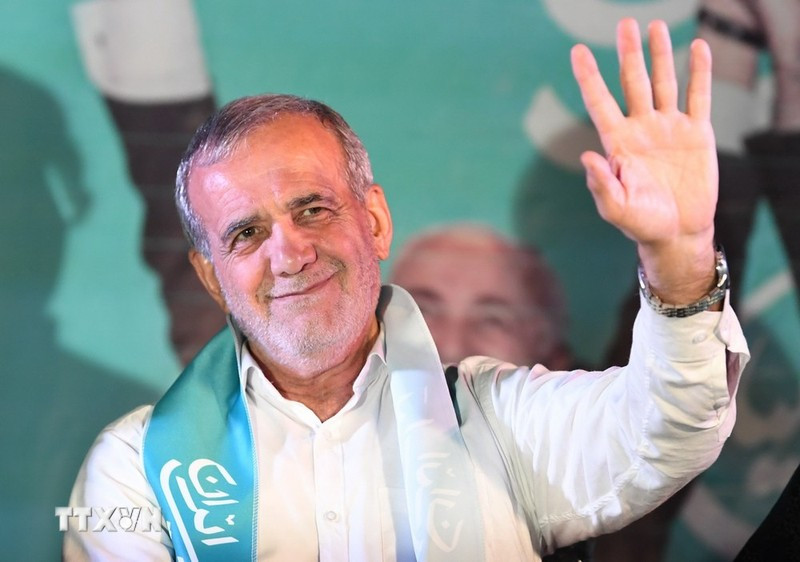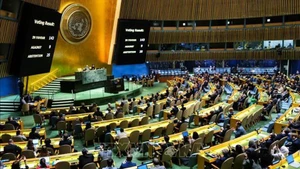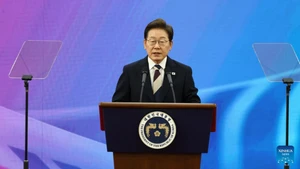Reform efforts in Iran have drawn considerable attention since the late 1990s, particularly during the presidency of Mohammad Khatami. Reformists advocate for a more open society, economic modernisation, and improved relations with the international community. Victory in Iran's 14th presidential election went to Masoud Pezeshkian — a reformist, heart surgeon, and former Minister of Health under President Mohammad Khatami.
Emphasising reformist values in his campaign, President-elect Masoud Pezeshkian brings new momentum, aiming for significant changes in a country that has experienced many political and economic upheavals in recent years.
Addressing domestic issues
Winning the race to become Iran's president, Masoud Pezeshkian immediately called on the people to stand together on the “difficult path ahead”. Committed to serving and listening to the people's concerns, he acknowledged the challenges the new administration must face, including economic issues heavily impacted by sanctions, especially those imposed by the US after Washington withdrew from the historic nuclear deal known as the Joint Comprehensive Plan of Action (JCPOA) in 2018. High inflation and unemployment rates, along with a decline in living standards, have also created numerous problems for the Islamic Republic.
Placing their trust in a reformist president to lead the country, the Iranian people anticipate economic reforms including anti-corruption measures, increased transparency, and infrastructure modernisation. Re-engagement with international organisations and attracting foreign investment to revitalise the domestic economy are also of great interest. However, the most anticipated act is the newly elected president's approach to the JCPOA.
In fact, during his campaign, Pezeshkian repeatedly emphasised his determination to pursue diplomatic efforts to restore the nuclear deal, which is expected to lift sanctions and provide the necessary impetus for the economy. Analysts believe that successful negotiations could unfreeze Iran's overseas assets, boost oil exports, and stabilise the economic environment. However, this requires diplomatic finesse and readiness to make concessions, which could be contentious within Iran.
In addition to policies promoting economic development, Iranians also have put expectations on social reforms, including the expansion of personal freedoms. Many young Iranians with increasing educational levels are dissatisfied with economic hardships and social restrictions, as well as issues related to women's rights, gender equality, and educational and employment opportunities. They also expect the government to promote inclusiveness, protect the rights of ethnic and religious minorities, and foster national unity.
Priorities on foreign affairs
In external relations, the election of a reformist president could lead to changes in Tehran's foreign policy. After the election results were announced, this became even clearer. Rejoining the JCPOA and improving relations with the US and European countries are seen as top priorities for the new administration in Iran.
In his post-election message, despite criticising European countries for abandoning their commitments to salvage the historic JCPOA and mitigating the impact of sanctions, Iran's President-elect expressed a desire to engage in constructive dialogue with European nations to set the relationship on the right path, based on the principles of equality and mutual respect.
At a recent meeting of the United Nations Security Council in New York, the Iranian Foreign Ministry leader outlined President-elect Masoud Pezeshkian's stance, emphasising that Tehran focuses on promoting multilateralism, opening new horizons for cooperation, and expanding friendly relations with partners. While criticising unilateral sanctions, Iran welcomes the resumption of negotiations with the US to restore both parties' participation in the nuclear deal. This could pave the way for lifting economic sanctions, normalising trade relations, and attracting foreign investment.
Along with the desire to improve relations with the West, Tehran also aims to further strengthen ties with China, Russia, and neighbouring countries. In the Middle East, Iran's new president may seek to de-escalate conflicts and promote more stable and constructive relationships with neighbouring countries. Iran's involvement in regional conflicts has drawn criticism and caused tensions. A more moderate foreign policy could help reduce these pressures and enhance Iran's position in the region.
Iran is facing many opportunities for positive change, but the new administration also recognises the challenges. Experts suggest that economic difficulties and geopolitical tensions pose significant obstacles to Iran's reform agenda. Additionally, the new president must balance public pressure while being hopeful for change and sceptical of "political promises." The adjustment of public expectations to align with the complex political and economic realities of Iran is an issue that the new administration may need to consider. Furthermore, balancing the pursuit of reforms with maintaining stability is crucial for the new administration in Iran.
With the desire to make the Islamic Republic more prosperous economically, socially open, and more connected to the international community, Iran's new government is committed to promoting dialogue, national unity, and consensus, while welcoming sincere efforts to ease tensions with the spirit of "responding to goodwill with goodwill." The upcoming changes in politics and socio-economics bring hope for a more open, prosperous, and comprehensively developed Iran.
However, to achieve these goals, significant efforts from both the leaders and the people are needed. Iran's success will largely depend on effective governance, foreign policy strategies, and broad support for the reform programme. The path ahead is challenging, but the forthcoming changes promise a better future for the people.
















